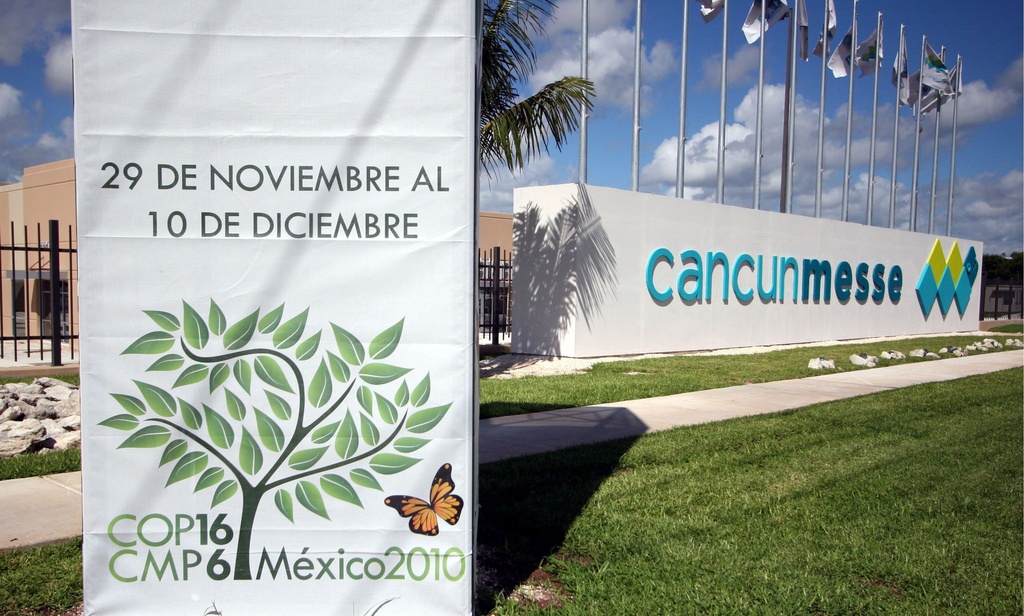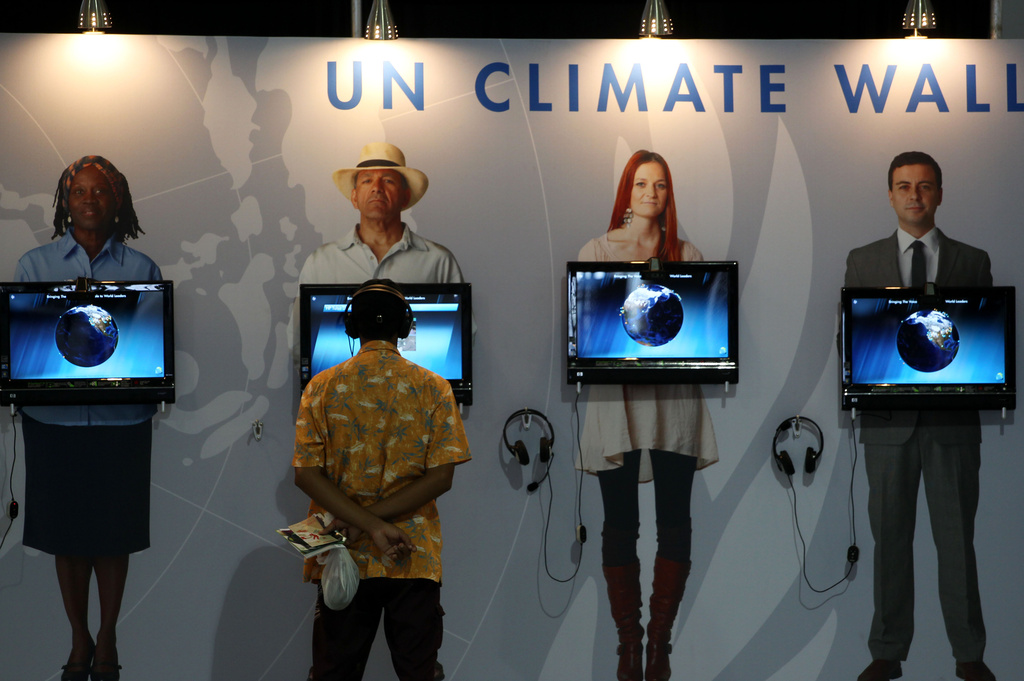Swiss minister talks business in Cancun

Swiss Environment Minister Doris Leuthard talks to swissinfo.ch about the importance of a legally binding climate accord and of getting business more involved.
In her speech to delegates at the United Nations climate summit in Mexico, Leuthard stressed the economic argument that while doing something costs money, doing nothing costs far more.
Leuthard, who also serves as this year’s president and was until recently Swiss economics minister, called on every nation to cooperate, pointing out that climate policies must not cease at national borders.
In her speech in Cancun on Wednesday, she suggested that a price be put on carbon dioxide and that all countries set reduction targets.
swissinfo.ch: You have just taken over from Moritz Leuenberger as head of the Swiss environment ministry; these talks must be quite a tough initiation for you.
Doris Leuthard: This is the first time that I’ve met other environment ministers and it’s rather different from what I have experienced in the past.
But the mechanisms are always the same; it’s all about first defending national interests. Then you have to discuss, find consensus in small groups and seek out allies. That takes time; it’s a bit like a marathon, but step by step we are making progress.
It may take another year, but that’s the only way we’ll end up with international rules that everyone agrees on and which respect the sensitivities of all members and the vulnerabilities of those who do not have the financial tools to improve their own situation.
swissinfo.ch: Are the climate talks more complex than negotiations at the World Trade Organization (WTO)?
D.L.: Delegates at the WTO have completed nine years of negotiations. I can’t really say that climate talks are more complex. The thing is that at the WTO you have six or seven issues being discussed in parallel and there is even more money at stake. The two things are incomparable, but there are certain lessons you can draw from the mechanisms or successes at the WTO.
At same time, I would really like to see a strengthening of the WTO’s green focus. This has been Switzerland’s aim since the Bali climate conference in 2007. Lowering customs duties could encourage technological transfer, for example. There are a number of different ideas, but we have to convince the international community.
swissinfo.ch: What changes would you like to make to the Swiss approach to the climate talks?
D.L.: Everything has been going well for some time now from a Swiss perspective. For me the main thing is to support our team of negotiators. And at the ministerial level, it’s important to network.
There is still work to do in terms of defending Switzerland’s positions and encouraging those who could become partners. We have major partners involved in the climate talks process via the French-speaking nations, which represent one-third of all United Nations members, and the Environmental Integrity Group [a negotiating group comprising Switzerland, Mexico and South Korea].
swissinfo.ch: In your speech on Wednesday you stressed the message that politicians should send to business – that they are key to the climate talks.
D.L.: Exactly; the public sector alone will be unable to provide the SFr100 billion [a year from 2020] that has to be invested, especially in developing countries. The Swiss position is that economic mechanisms are needed that encourage the private sector.
swissinfo.ch: This is already happening in Switzerland, isn’t it?
D.L.: Yes; it works quite well in Switzerland with our carbon dioxide tax and building sector incentives, for example. But special bank instruments are also required that allow individuals to invest in environmental funds rather than in gold.
swissinfo.ch: Are the banks ready if the politicians send a clear signal?
D.L.: I get quite positive signs from the banking sector, which is very keen. Some financial products are already available, but the banks are obviously waiting for a credible global legislative framework that covers the entire international community. This is what’s missing right now.
Some existing mechanisms are not really that credible, like the Clean Development Mechanism (CDM) [industrialised states pay for emission reduction projects in poorer countries in return for credits that are used to attain their own CO2 emission targets]. It is essential that the credibility of such instruments is improved and that an international market is established.
swissinfo.ch: In your speech you also insisted on the fact that whatever future climate accord is agreed upon, it has to be legally binding. Why is that?
D.L.: We believe that the promises to reduce CO2 emissions made by some of the large emitters are unlikely to be successful. Such an approach will not convince Swiss citizens to invest and to endure quite tough national restrictions in the hope that these promises will be met.
That position [a legally binding accord] is very important. I hope that our negotiators will manage also to convince the developing nations that this is the smartest and most promising way forward.
The UN Climate Change Conference runs in Cancun, Mexico, until December 10.
The negotiating process revolves around sessions of the signatory parties to the UN Framework Convention on Climate Change (UNFCCC), which meet annually to review how the convention is being implemented.
Talks include the issues of adaptation, reducing greenhouse gas emissions, climate finance, and the future of the Kyoto Protocol, which expires in 2012.
In its position outlined on November 17, the Swiss government declared that it supported the non-binding agreement reached last year in Copenhagen – a two degree Celsius limit for rising temperatures.
The government supports a follow-up to the Kyoto Protocol, but also sets out a proviso: that industrialised nations not party to the Protocol – such as the United States – take on the same legally binding greenhouse gas emission reductions.
As part of its negotiating mandate given to Leuthard, the cabinet said that it was prepared to cut greenhouse gas emissions by at least 20 per cent by 2020, compared with 1990 levels, and would raise the stakes to 30 per cent if other countries followed suit.
Switzerland also backs a “considerable” increase in financial support to developing countries for measures aimed at emission reduction and adaptation to climate change. But it will only pay more if newly industrialised states agree to contribute.
For the issue of financing adaptation measures, states have agreed to set up a special fund worth $100 billion a year from 2020 onwards to help the most vulnerable countries.
(Translated from French by Simon Bradley)

In compliance with the JTI standards
More: SWI swissinfo.ch certified by the Journalism Trust Initiative













You can find an overview of ongoing debates with our journalists here . Please join us!
If you want to start a conversation about a topic raised in this article or want to report factual errors, email us at english@swissinfo.ch.